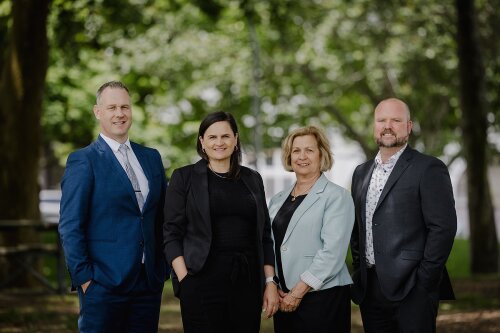Best Tax Lawyers in Cambridge
Share your needs with us, get contacted by law firms.
Free. Takes 2 min.
List of the best lawyers in Cambridge, New Zealand
About Tax Law in Cambridge, New Zealand
Cambridge is a town in the Waipa District within the Waikato region. Tax law in Cambridge follows New Zealand-wide rules, administered by the Inland Revenue Department (IRD). Local property rates are managed by the Waipa District Council under national rating legislation. Residents and businesses in Cambridge navigate both central taxes and local rate obligations.
In practice, Cambridge residents and businesses interact with central tax regimes such as income tax and goods and services tax (GST), while local councils set rates for property and services. The tax system in Cambridge aligns with the broader New Zealand framework, so understanding both national and local requirements helps avoid penalties and maximize compliance. For official guidance, consult the IRD and the NZ Legislation repository.
Key fact: The Inland Revenue Department administers most central taxes in New Zealand, including income tax and GST.
For authoritative guidance, see the Inland Revenue Department at ird.govt.nz and the official statutes at legislation.govt.nz.
Why You May Need a Lawyer
-
A Cambridge landlord faces an Inland Revenue audit of rental income. If you have three or more rental properties or complex deductions, a solicitor can prepare supporting records, respond to IRD requests, and expedite a fair resolution.
-
You are buying or selling a Cambridge property and the bright-line test may apply. A tax attorney can determine eligibility for exemptions and help structure the sale to minimize liability.
-
You start a small business in Cambridge and must decide when to register for GST. A lawyer can review turnover thresholds, invoicing, and compliance with GST requirements, coordinating with an accountant.
-
You are considering a trust for farm assets in Waipa District. A solicitor can draft or revise the trust deed, advise on distribution taxation, and coordinate with estate planning goals.
-
Your Cambridge employer is reviewing payroll options and fringe benefits. A legal adviser can help classify workers correctly and avoid penalties for misclassification or FBT mistakes.
-
You receive a penalty or interest notice from IRD. A tax attorney can file a formal objection, negotiate penalties, and represent you in proceedings.
Local Laws Overview
Local tax matters in Cambridge hinge on national tax law and local rating rules. The following statutes shape how taxes and rates operate in this area:
- Income Tax Act 2007 - governs how individuals and businesses calculate and pay income tax in New Zealand. It sets rates, brackets, and allowable deductions.
- Tax Administration Act 1994 - establishes the processes for assessment, collection, audits, and penalties, including objections and disputes.
- Goods and Services Tax Act 1985 - creates the GST regime, including registration thresholds and compliance obligations for suppliers and customers. The current standard GST rate is 15 percent.
- Local Government (Rating) Act 2002 - provides the framework for local authority rates, valuation, and collection by councils such as Waipa District Council.
- Taxation (Bright-line Test for Residential Property) Act 2015 - introduces the bright-line period for taxing gains on residential property sales; the period has changed over time and is subject to updates, so consult the IRD for the current rule as at the time of your transaction.
Recent trends include ongoing updates to the bright-line regime and ongoing emphasis on GST compliance for small businesses. For current guidance on how these laws affect Cambridge residents, consult the IRD and the NZ Legislation repository. See official resources for definitions, dates, and obligations:
- Inland Revenue Department: ird.govt.nz
- NZ Legislation: legislation.govt.nz
Frequently Asked Questions
What is the bright-line test for residential property in New Zealand?
The bright-line test taxes gains from the sale of residential property within a set period. The period and exemptions have changed over time, so check current IRD guidance before selling. This rule applies to properties held as investments in Cambridge and elsewhere in New Zealand.
How do I know if I need to register for GST in Cambridge?
You must register for GST if your taxable supplies exceed a threshold in a 12 month period, currently 60,000 NZD. If you are close to the threshold, seek a professional opinion to avoid penalties for late registration.
When should I expect to file my annual tax return in New Zealand?
Most individuals file annual income tax returns after the end of the tax year, with deadlines set by IRD. The exact date depends on your filing method and residency status.
Where can I find my local rates information for Cambridge?
Local rates are issued by Waipa District Council. You can view rate notices, payment options, and valuation details on the council's website.
Why might the IRD audit my rental income in Cambridge?
Audits focus on accuracy of declared income, deductions, and depreciation. Complex property portfolios or large deductions are more likely to trigger reviews.
Can I dispute a tax assessment from IRD?
Yes. You can lodge an objection with IRD and, if needed, pursue a formal review or appeal through appropriate tribunals or courts. Legal representation can support the process.
Should I form a trust to manage farm assets in Cambridge?
A trust can offer control and estate planning benefits but adds tax and compliance obligations. A solicitor can help compare benefits and drawbacks for your specific farm operation.
Do I need a lawyer to handle a tax dispute?
While you can handle simple matters yourself, a tax lawyer provides experience with evidence gathering, negotiation, and formal proceedings if a dispute escalates.
Is there a difference between a solicitor and an attorney in New Zealand?
New Zealand typically uses solicitor and barrister roles. A solicitor handles most legal work, while a barrister may be engaged for court advocacy if required.
How long does a typical tax dispute take in Cambridge?
Average timelines vary by complexity. A standard objection may take several months, while more complex cases can stretch to a year or more if escalated.
What should I prepare before meeting a tax lawyer?
Gather last year’s tax returns, notices from IRD, property records, and any correspondence about audits or penalties. Also bring questions about fees and expected timelines.
Additional Resources
- Inland Revenue Department (IRD) - Official NZ tax authority that administers income tax, GST, and penalties; provides guidance, tools, and dispute processes. ird.govt.nz
- NZ Legislation - Official repository for New Zealand statutes and amendments, including the acts listed above. legislation.govt.nz
- Waipa District Council - Local authority responsible for rates, property valuations, and local regulations affecting Cambridge residents. waipadc.govt.nz
Next Steps
- Define your issue - Write a one-page summary of your tax matter, including any notices, dates, and what outcome you want. (1-2 days)
- Gather documents - Collect tax returns, IRD correspondence, property records, and contracts. Organize by topic (rental income, GST, property sale). (3-7 days)
- Identify potential lawyers - Look for Cambridge or Waikato-based tax lawyers or solicitors with experience in tax disputes, GST, and property transactions. (1-2 weeks)
- Check credentials - Review practice areas, recent cases, and client reviews. Confirm availability for an initial consult. (3-5 days)
- Schedule consultations - Book initial meetings with 2-3 lawyers to compare approach, fees, and expectations. (2-4 weeks)
- Discuss fees and timelines - Ask for fixed fees or hourly rates, retainer needs, and typical case timelines for Cambridge matters. (During consultations)
- Make a decision and engage - Choose the solicitor or conveyancing lawyer who best fits your needs and sign a fee agreement. (Within 1-2 weeks after final consult)
Lawzana helps you find the best lawyers and law firms in Cambridge through a curated and pre-screened list of qualified legal professionals. Our platform offers rankings and detailed profiles of attorneys and law firms, allowing you to compare based on practice areas, including Tax, experience, and client feedback.
Each profile includes a description of the firm's areas of practice, client reviews, team members and partners, year of establishment, spoken languages, office locations, contact information, social media presence, and any published articles or resources. Most firms on our platform speak English and are experienced in both local and international legal matters.
Get a quote from top-rated law firms in Cambridge, New Zealand — quickly, securely, and without unnecessary hassle.
Disclaimer:
The information provided on this page is for general informational purposes only and does not constitute legal advice. While we strive to ensure the accuracy and relevance of the content, legal information may change over time, and interpretations of the law can vary. You should always consult with a qualified legal professional for advice specific to your situation.
We disclaim all liability for actions taken or not taken based on the content of this page. If you believe any information is incorrect or outdated, please contact us, and we will review and update it where appropriate.










